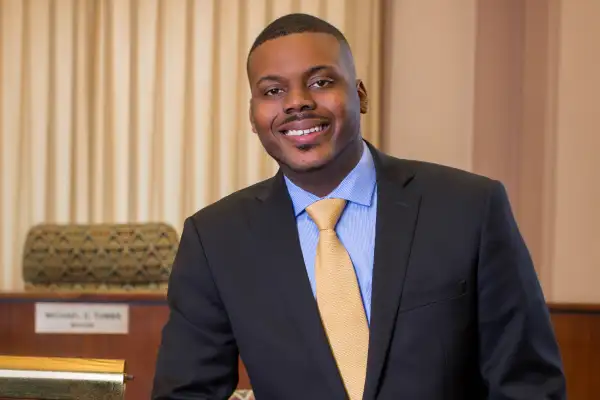Why This 27-Year-Old Mayor Is Giving His City's Poorest Residents $500 a Month--No Strings Attached

For the typical family in Stockton, Calif. $500 extra month is a lot. It could be enough to lease a new car or feed a small family or cover about half what they owe in rent.
Could it also be enough to lift them into the middle class?
Michael Tubbs, the 27-year-old mayor of the struggling city where one in four residents live in poverty, thinks so. Now, with a big grant funded by Silicon Valley, he’s about to find out.
The city is getting ready to give 100 Stockton families $500 a month, with no strings attached, for up to 18 months. The idea -- essentially the government handing out free money -- may seem far-fetched. But the aim is to find ways to shore up left-behind areas of the economy in an era when economic growth is concentrated in fewer and fewer hands.
“The vast majority of people are struggling in the current arrangement. The middle-class in becoming invisible.” says Tubbs, who grew up in Stockton, in a family that was itself often living hand to mouth, before eventually winning a place at Stanford and returning to run for mayor in 2016.
Once a thriving town that benefited from the huge run up in home prices in the early 2000s, Stockton was hit hard by the housing crash, at one point being dubbed the foreclosure crisis's "ground zero." Falling tax revenue, combined with fiscal mismanagement forced the town to file for bankruptcy in 2012. Today, the median income in Stockton is less than $45,000 compared to more than $59,000 nationally.
Tubbs says the $500 a month is designed to give people who are underemployed or working a full-time job yet still can’t make ends meet an extra financial cushion, often the leg-up they need to finish a degree or start a business. “People don’t stop working. They actually get into the workforce more,” he says, citing examples like the Alaska Permanent Fund and a recent experiment in Canada. “We see bad things go down like drug use. Good things go up like education. People report feeling happier, feeling less stressed. You see more productivity.”
Tubbs’ idea may seem strange but the idea isn’t new. Known among wonks as a “universal basic income” variations of the idea stretch as far back as the 1700s, with founding father Thomas Paine once floating something similar. It’s not just left-wingers either. Milton Friedman, a Nobel Prize winning economist known for free-market views, and President Richard Nixon, supported versions of the idea, in part because they thought replacing sprawling government programs with a simple check would help keep government small.
More recently the idea has seen a revival, with many fans in tech, perhaps feeling ambivalent about their role in destroying jobs with new technologies and automation. Tubbs first hit upon the idea when he met people at a “future of work” conference in the Bay area. He connected with an organization started by tech heavyweights like Chris Hughes, a co-founder of Facebook, which focuses on how to rethink creating economic opportunity for everyone, starting with free cash. The Stockton program is based on a $1 million grant from the organization. Tubbs plans to start enrolling participants in August. Although Stockton plans to target low-income families, the specific criteria have not yet been set.
The immediate goal of the Stockton experiment is to collect data on how no-strings attached money impacts every aspect of low to middle income people’s daily lives — work ethic, overall health and well-being, time spent with family or investing in their children’s education, said Lori Ospina, the program’s director. Tubbs and Ospina hope their data will spark get a larger conversation about universal income. If it works, Tubbs hopes it's something that will scale nationally.
"My hope is that it will create such a buzz at the state and national level we’d have to have a conversation about expanding it to everyone, no matter what city they live in," he said.
Stockton’s program has plenty of skeptics. “I would prefer an approach that tells people, we will help you get jobs," says Aparna Mathur, a resident scholar at the conservative-leaning think tank American Enterprise Institute. She touts a Trump Administration apprenticeship program that focuses on doubling the amount of apprenticeships in the U.S. as an alternative. “I don’t think the solution is to say, “OK, lets just start handing people cash.”
If a universal income program like Stockton’s really did expand, an even bigger issue may be the price tag. In Stockton, with philanthropists footing the bill that isn’t a problem. But a national program could be enormously expensive – although just how expensive depends on the parameters. The Center on Budget and Policy Priorities pointed out a truly “universal” basic income program handing all 300 million Americans $10,000 a year, or about $830 a month, would cost $3 trillion, nearly double the entire yearly federal budget. The U.S. National Debt is already at $21 trillion and counting and the federal budget for social security was $813 billion in 2017.
Still Tubbs is optimistic. “That’s what people are saying, that there’s no way it can scale out, it’s too unaffordable,” he said. “But again, I think things like social security, Medicare — almost every benefit we have now at one point was called too expensive. It can start iteratively. It doesn’t have to start at a huge level. Those concerns are raised with any new thing the government does."